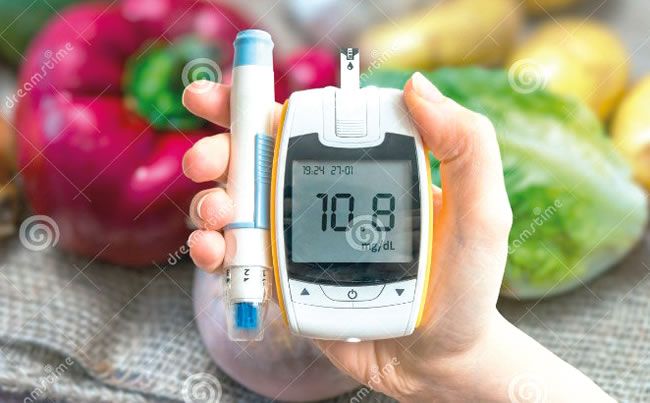Diabetes is one of the most prominent and challenging disease with no cure as many people are living with it and pay little or no attention to their health. Kuraun Vincent writes on how it can be managed.
Diabetes also known as diabetes mellitus (high blood glucose) is a disease resulting from too much sugar in the blood. According to research, diabetes is one of the most prominent diseases all over the world and the most challenging which has no cure but can be controlled and managed.
Diabetes, if left uncheck or uncontrolled can have damaging effects on health as it comes with a lot of complications including chronic kidney disease as too much glucose in the blood can damage kidney filters. Other common diabetes complications are heart disease, nerve damage, foot health, hearing loss, vision loss among others.
It is believed that millions of people are living with diabetes without knowing that they have the disease condition despite the awareness. During this year’s World Diabetes Day held on 14th November of every year, with the theme “Education to Protect Tomorrow” the International Diabetes Federation (IDF) had called on policymakers to increase access to diabetes education to help improve the lives of the subjects living with diabetes.
But how deadly is diabetes and is sufficient awareness about the disease being created among the people.
A Senior Lecturer at the College of Medicine, University of Lagos and Honorary Consultant Endocrinologist to the Lagos University Teaching Hospital (LUTH), Dr Ifedayo Odeniyi, in an interview with Sunday Tribune explained that, “diabetes is a disease that affects virtually everybody; nobody is spared, the rich and the poor, the low and the mighty.
“Simply put, diabetes is not communicable, so, it cannot be transfer from one person to the other. The bottom line about this condition is that the body is unable to handle glucose very well, and that is why the glucose in the body is very high. Where is this glucose coming from?” It comes from the food that we eat. No matter what we eat, the body transforms it into glucose because glucose is that molecule that the body can breakdown.”
Explaining why the body sometimes is unable to break down glucose, Odeniyi said it is because a major hormone, insulin, that is needed is lacking.
“What is responsible for this low insulin production is because the organ that produces insulin in the body is not producing enough, and there are lots of things that could be responsible for this: As we grow old, we have the tendency to have diabetes. If you have a family history of diabetes, the risk factor is there. The environment also influences the production of insulin.
“The other thing that plays out in diabetes is, when the insulin that is also produced is not working well, and that is what we called insulin resistance. So simply put, the problem with diabetes is, when there is reduction in production of insulin, or insulin is absent like we have in type 1.
“In the common one that we see which is type 2, the insulin production is reduced, and that small quantity is also not working well. The consequence of this is that the glucose level will be very high in the body. In type 1, there is no insulin at all. people who have type 1 will require insulin injection for survival on a daily basis for life” he explained.
Giving further explanation on the nature of diabetes, Dr Akin Akinmokun, a Physician/Endocrinologist who also doubles as the Managing Director AB Specialist Hospital,explained that while Type 1 diabetes is not preventable, Type 2 is preventable, can be prevented.
“The type 1 is usually due to autoimmune destruction of the pancreas and we have no control over that. Autoimmune destruction means, the body fails to recognise it own tissues. Type 1 diabetes is usually seeing in children, it is very common in children. Type 2 diabetes is lifestyle related and that is why we kept emphasising the fact that you can do something about that one since is lifestyle related.”
Reacting also to lifestyle associated with diabetes, Dr Akinmokun said, “What is the lifestyle that would be associated with diabetes? When you eat too much and become big and then, the amount of insulin produce by your body can not cope with your size because the production is configured to take care of a 70 kilogram man and when you are 140 kilogram, the insulin cannot cope. No matter how it tries to increase production base on your size, it will get to a level where it cannot cope anymore.
“So, obesity is a reversible cause of type 2 diabetes and is preventable. Diabetes can be reverse” he stated. “The one that usually either lifestyle related or other secondary issues related can be reverse. For example, there is pregnancy induced diabetes, and there is drugs induced diabetes. All these can be reverse if you stop the drug, you may be able to reverse. So weight, pregnancy, drugs associated diabetes are all potentially reversible,” he stated.
Diabetes in Pregnancy
Speaking with Sunday Tribune about diabetes in pregnancy, Dr Margaret Obienu said, “the increasing incidence of diabetes mellitus in pregnancy could be attributed not only to an increased number of women of reproductive age with diabetes but also an increase in the incidence of gestational diabetes. We are seeing more young women with diabetes and pregnant women with gestational diabetes now.
“Gestational diabetes is elevated blood sugar first noticed in pregnancy that reverses after pregnancy. For women with gestational diabetes, there is a 50% chance of developing diabetes later in life. The risk factors for gestational diabetes include advanced maternal age, obesity, previous history of gestational diabetes, previous history of delivering a baby with birth weight equal to or greater than 4kg, history of diabetes in a first degree relative, amongst others”.
Speaking further about complication of diabetes in pregnancy, Dr Obienu said, “diabetes in pregnancy has serious complications both to the mother and to the baby. The complications of gestational diabetes include polyhydramnios (increased liquour volume), risk of prelabour rupture of membranes (i.e. early drainage of liquour), preterm labour and delivery, difficult vaginal delivery as in shoulder dystocia (ie when the baby’s shoulders are unable to pass through the birth canal unaided during delivery), obstructed labour, increased risk of operative delivery, etc.
“For those already diabetic before pregnancy whose sugar control is suboptimal, in addition to the above, there is the risk of worsening of already existing complications of diabetes (like retinopathy, nephropathy), congenital anomaly, miscarriage, etc. For the baby, there is the risk of prematurity and its associated complications, macrosomia (birth weight 4kg and above), risk of hospital admission after delivery, hypoglycaemia (that is low blood sugar level), jaundice, developing diabetes later in life and even sudden unexplained while still in the womb.
She further added, “Every family looks forward to a stress-free pregnancy that culminates in the delivery of a healthy baby to a healthy mother. In as much as diabetes can affect pregnancy and pregnancy can also affect diabetes, being diabetic or having gestational diabetes should not be a cause for despair as these group of women can also have favourable outcomes. The care for these women should be multidisciplinary involving the obstetrician, endocrinologist, dietician and even the neonatologist.”
She stated that “optimal blood sugar control in pregnancy is very important. It would involve lifestyle modification such as dietary control (eating more of vegetables and fruits, and less carbohydrate especially processed carbohydrates). Sometimes, medications (eg insulin) may have to be added for optimal blood sugar control. These women need to be regular with their antenatal clinic visits and should report any complain they have no matter how insignificant they think it is. Complaints such as reduced perception of baby’s movement should be reported to the hospital immediately.”
Dr. Obienu advised that, “Women already diabetic should seek preconception care once they are desirous of pregnancy. This helps in implementing the necessary measures such as optimising blood sugar control, changing of some medications to the ones safe in pregnancy and mapping out the care plan which is usually individualised for the safety of the mother and baby during the pregnancy and beyond.”
Managing Diabetes
Explaining how to manage the disease in sufferers, Dr Odeniyi said that, “managing diabetes in people who already have it is not difficult. I always tell my patient; the fact that one has diabetes is not a death sentence. In managing diabetes, the first thing we want them to know is the reason why they have it in the first place. To let them know that, this is what is happening that is making your glucose level to be very high, when they accept that, because some people always attribute anything that happens to them to the spiritual. So we let them know this is not a spiritual thing, it is a apart of the body that is not working well.
“So, what do we want to achieve by managing diabetes? We want that individual to have a very good quality of life, and how do we achieve this? By making sure that the patients adjust their lifestyle and that comes into exercise, diet. Now, for those who smoke, they must stop smoking. For those who take alcohol, worldwide the advice they would get is that, they should cut down on the alcohol consumption.
“However, if they can stop it, it is very beneficial. So this lifestyle modification also applies to the way we treat these patients.” Basically, this is to say that, smoking and alcohol are factors contributing to increase in diabetes.
“Advice on diet is one area where most people get depressed because most people are sentence to a particular set of food. They tell them don’t eat this, don’t eat that, and at the end of the day, the patient get depressed because what is left is just one kind of food.”
Odeniyi, however, explained that diabeticsglobally are usually encouraged to eat foods that are available locally.
“The way we managed our patients worldwide is that, the patient is managed with the food that is locally available and is culturally acceptable to that patient. So the patient need not break the bank to feed.
“So, what kind of food can they eat” He asked. “They can eat any food in small quantity. We advice them to stay away from the soft drinks which has a lot of sugar, but our traditional food either it is Pounded yam, either it is Eba, either it is Fufu, either it is Rice can be taking in a small quantity with a lot of vegetables. That is diet. So, if they are able to do that, we can now combine diet with medications.
“Now, there are different types of medications in the market, the doctor look at the profile of the patient, examined the patient and based on these findings, the doctor decide which medicine best suit the individual and that is why you will not find two patients on the same drug. That is the way we manage them. Then, is not just about lifestyle and medication; the patient also must monitor their glucose level.
“How do you know a student is doing very well, unless you check by administering a test and that is why we encourage them to get their own personal machines which we called the glucometer, that they can use in checking and recording it so that their doctor can see it and when they go to the clinic, they go with that record for the doctor to look at it after the doctor would have set a target that is good for them.”
Dr Akinmokun emphasising also on the best option for diabetes management buttress that, diabetes specialists are arguably the most competent regarding diabetes care owing to their special training in this discipline, according to him, “my advice is that, for children, they need to consult a specialist because we found that a lot of people are dying unnecessary because a lot of doctors do not know how to manage diabetes especially these ones that require insulin.
“In children, they require insulin and a lot of doctors don’t know how to use insulin, and so, they are mismanaged and they have issues. So I will advice that children who have diabetes should venture to see endocrinologist who can better manage their diabetes particularly because of insulin use.
Recent prevalence
Examining the recent prevalence rate for diabetes in Nigeria, Dr Odeniyi said, “In the recent meta analysis, looking at the prevalence, when we look at the geopolitical zones, we have a higher prevalence in the South- South. 9.8% in the South-South, in the North-West 5, 9%, in the North-East 3.8%, in the South-West 4.6% and in the North-Central 5.5%.
“If you put this all together and you want to look at what is prevalence of diabetes in Nigeria, in that recent study, we put it at 5.8%. Now that translates to about 6 million people which is conservative. So the prevalence of 5.8% which is about 6 millions adults, we have children also suffering from this. That means, when you put the prevalence together it will be a little bit above 5.8% and the number would be above 6 million.
“That is huge and those are the people that are diagnosed. Today, studies shows that we have a lot of people out there who have diabetes and half of them are not diagnosed. Of those who are diagnosed, half of them are not on treatment because they don’t have access to care. Of those who have access to care, half of them cannot afford to buy the medication. So at the end of the day, we now have a lot of people who had the disease coming down with complications and these are the huge workforce that should be productive for a nation.” He lamented.
Again, corroborating Dr Odeniyi’s claim, Dr Akinmokun said, base on previous studies, “the prevalence is between 2-5% depending on the area. In the urban is about 5% while in the rural areas is about 2% because in the urban area we live a sedentary life, in rural areas they are nomadic, they walk around, they go to farms and that help their body because when you are trying to manage diabetes, diet is very important, exercise is also a major factor in managing and living with diabetes”
What to do when you have diabetes
Issuing his advice to the society as a specialist in diabetes management, Dr Odeniyi said, “my advice to the society is, when you are told you have diabetes, you don’t need to be afraid, is just a call to live a better life, and it means you must be discipline to be able to follow a doctor’s instructions.
“Now everybody should endeavour to get screened. If you don’t go for screening, there is no way you will know. We should quite the attitude of what I don’t know does not spoil my mind because when you don’t know, by the time some people are getting to know, they are already getting blind, erection has gone, they are having wound that is not healing very well.
“A woman would have lost so many pregnancies. These are the complications. We have women who have been pregnant so many times and in the first 3 months, they are losing the pregnancy because they don’t even know they have diabetes. So that is when some people get to know. Some people is when they can’t see very well and they will used so many eye drops and they finally end up in the hospital and see the eye specialist, the first thing they would do is to check their glucose level and that is how we pick up some of them.
“So all of us should routinely do a comprehensive medical check and when we are told we have diabetes, we should know that it is something that can be managed. There is no cure; it can be managed and one can live a very good quality of life.
“So my advice is, people should live healthy life, eat healthily. Our traditional foods are quite good, our foods are very rich in fibre, but we must exercise. Trekking some distance is actually very good for the body. When you are told you had diabetes, don’t think the world has ended. Just work with your doctor and work to achieve a very good result so that you can live a very long as God has created it.” he advised.
Also speaking, Dr Akinmokun said diabetes is not given to anyone by witchcraft.
“There are a lot of denials outside there and I can tell you of every diabetes that we diagnosed, there are 4 other ones walking around on the street that did not even know that they have diabetes.
“So, if you have family history of diabetes, you should be checking your blood sugar level from time to time for early diagnoses. Once diagnosed, you need to educate yourself very well about this disease and this is not peculiar to diabetes. Once you have any disease, you need to know A-Z of that disease because you are going to live with it.”
ALSO READ FROM NIGERIAN TRIBUNE
WATCH TOP VIDEOS FROM NIGERIAN TRIBUNE TV
- Relationship Hangout: Public vs Private Proposals – Which Truly Wins in Love?
- “No” Is a Complete Sentence: Why You Should Stop Feeling Guilty
- Relationship Hangout: Friendship Talk 2025 – How to Be a Good Friend & Big Questions on Friendship
- Police Overpower Armed Robbers in Ibadan After Fierce Struggle







